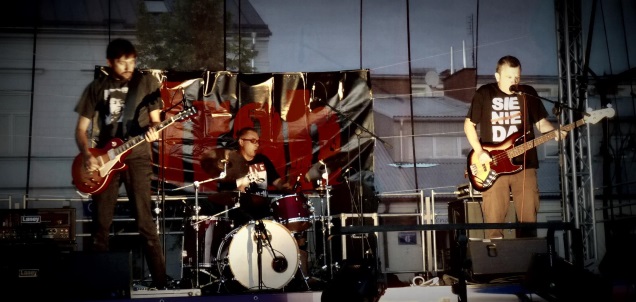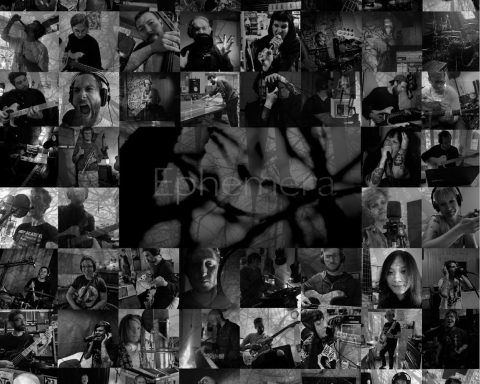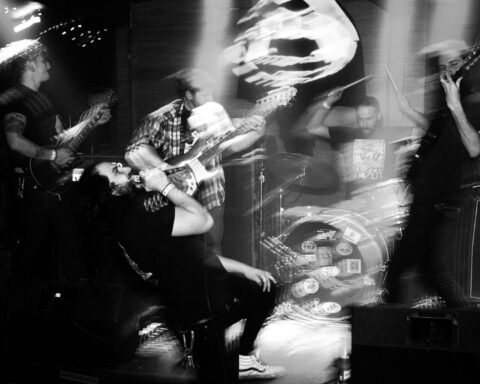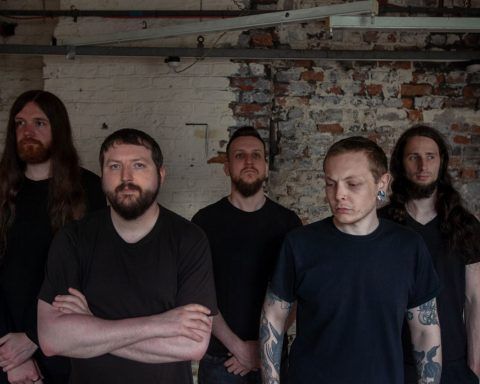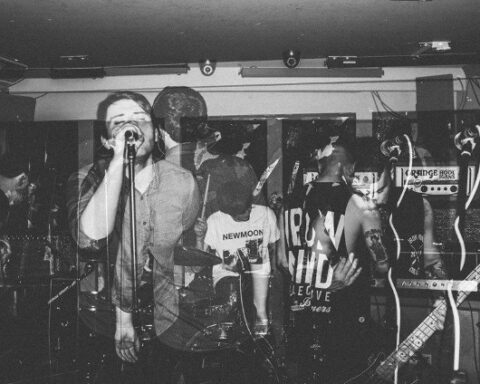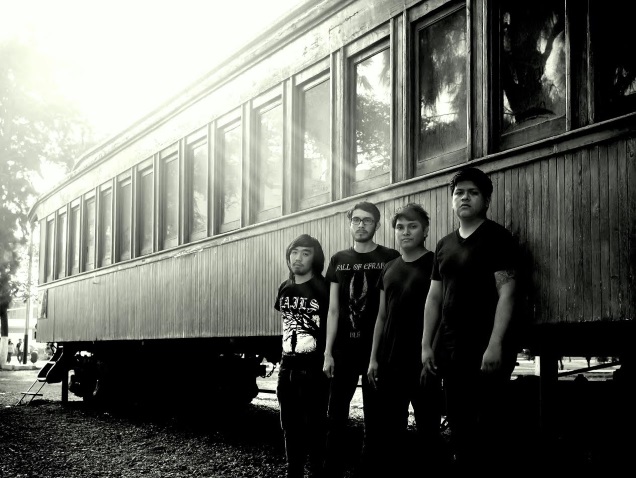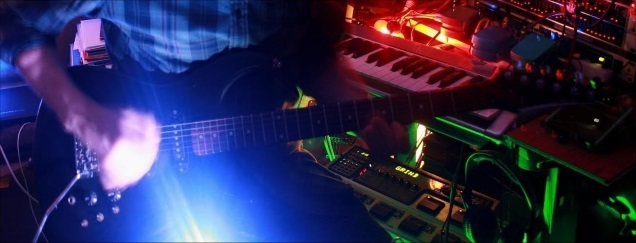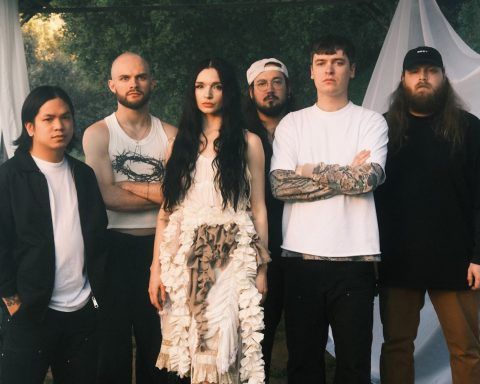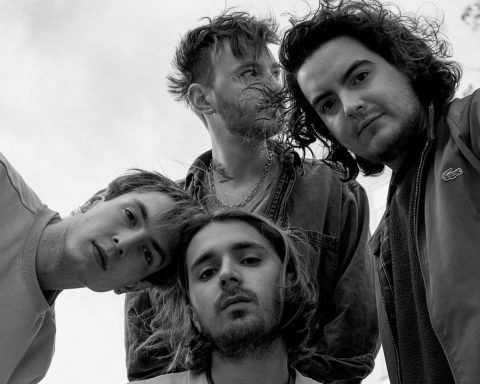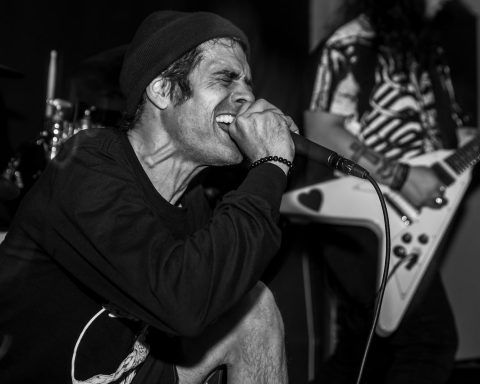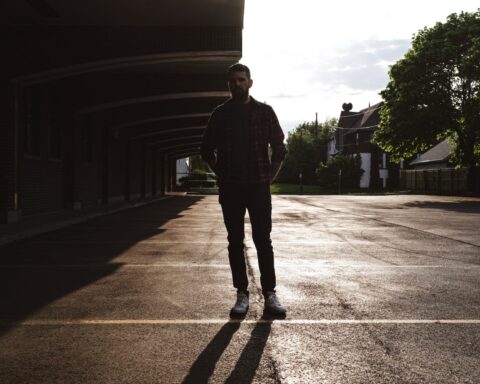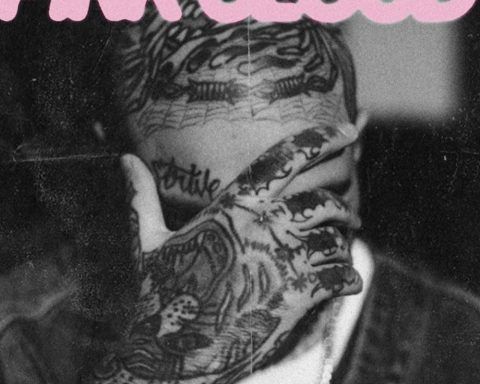Earlier this year, we spoke to Suwałki, Poland’s veteran rock / alt punk rock act DRAH about their own blend of psychedelic rock and punk rock, new album, and the band’s evolution, but we weren’t going to let them get off the e-mail without delving into some details on the good old 90s and their perception of independent punk rock scene in Poland.
DRAH‘s latest album “Nie ma nas tu” was recorded in December 2015 at the band’s own MordorStudio in Płociczno near Suwałki, Poland. Mixed by Artur Kisarewski, the record hit the streets in April 2016. Catch the band live at this weekend’s X Ost-Rock Underground fest in Ostróda and in early 2017 with INKWIZYCJA and ORPHANAGE NAMED EARTH in Suwłki, Poland on January 6th! Go here to RSVP.
DRAH is: Marcin Hościłowicz (vocals, bass), Maciek Makarewicz (guitar), and Artur Sofiński (drums).
Hi guys! Thanks so much for taking some time with IDIOTEQ. Please take us back to your early days in the 90s and tell us a but about your background. When did you start playing music and what inspirations led you to form a band?
Marcin (bass, vocal): We played our first gig with ARMIA (Polish legendary punk rock band) in 1992 in Suwałki, and the rehearsals must have been started a bit earlier.
Artur (drums): It was January 1991.
Marcin: Inspirations? Having good fun…. I don’t know. Hey, why did we start it at all?
Maciek (guitar): Maybe because it is easier to come up on the stage in a band… I guess I have always wanted to play. That’s it.
Artur: Marcin and I had played before DRAH. It was together with Kamil Bagiński as Tampon OB and Bigos. In the beginning it was just a way to spend time together.
Marcin: Then the independent stage somehow started to flourish and lots of bands started to play.
Maciek: Guitar music sort of came back at the time, grunge and so on.
Marcin: When the political system had changed in Poland, this whole music world opened up to us with all its inspirations.
Your official description uses terms like ‘MORDOR’, ‘halurock’ and ‘hardcore’ to describe your work. What are some of the defining features of your original style of performance?
Marcin: Mordor is the name of the studio where we record and rehearse. Maybe it’s derived from “murder your liver” (laughs).
Maciek: It used to be dark here…
Marcin: Halurock is my invention, mainly because Maciek likes the 70s and all the bands liked to experiment with drugs at the time. Hardcore is obvious ‘cause our music has elements of such music.
Artur: There are also lots of punk rhythms in our music although I don’t think we play pure punk or hardcore style. Maybe it’s kind of post-punk playing.
How do you remember your debut show with ARMIA? How was the independent rock and punk scene back then?
Maciek: Hmm…Stressful.
Artur: The audience was big, the band was well known…
Maciek: There was no singer at the time so we had to do it in an instrumental way
Artur: I remember when Stopa, ARMIA’s drummer at the time, asked me why I had put the bottom of the hi-hat on the top and the top on the bottom (laughs)… Now that’s how I always play it, but back then it was just stress.
Marcin: I also remember it being very stressful, but after the concert some people were really impressed with our performance. Quite a few people were surprised that we could play that well.
Artur: That was when people heard the name DRAH for the first time.
Marcin: As far as the independent stage in Suwałki is concerned, well at the time there was a group of people in the town who organized gigs, they were called Grupa Poczynań Frywolnych. Wojtek and Andrzej Żdanuk, mainly Wojtek kept it going. They did lots of concerts, everything worked really vigorously. There used to be even two big gigs a month, and I do not mean only local bands – UNDER THE GUN, AHIMSA, APATIA, INKWIZYCJA, DEZERTER, generally those were good times for independent bands, sort of boom. All of it was also inspirational, we also used to travel round Poland to see gigs, you know kind of crew. NOMEANSNO, FUGAZI, MDC, VICTIMS FAMILY, PRIMUS…. American hardcore scene was completely new for us and definitely very inspirational.
What were some of the most memorable moments, artists and works that defined your view of the 90s? What were the most inspiring things you experienced during that period?
Marcin: The whole grunge scene, and awareness that such music as hardcore exists
Maciek: This music became part of the mainstream at the time, MTV played it all the time.
Marcin: They played even BAD BRAINS who for me are really inspirational. For us somehow new horizons opened up, it was all new, awesome and exciting. Also thanks to going to concerts and organizing them, it turned out that there is a huge underground scene, and you can find out information about new bands, read fanzines and so on. QQRYQ, Antena Krzyku, Pasażer, Outside (Polish leading fanzines and independent labels), plenty of stuff. I have always been inspired by the Washington and New York scene. NOMEANSNO and everything which derived from them is my inspiration.
What made you decide to break up in 2000?
Marcin: Lack of time, families, work.
Maciek: There were a lot of things, the first and the most important was the tragic death of our vocalist Sasza. We were heading towards certain direction and suddenly there was the end.
Artur: After his death we continued with Czerwik on the vocal and we were somehow determined to record album Muchy, where we wanted to preserve the music we had done with Sasza. We close certain chapter and then there was no pressure to continue or do anything.
Marcin: We tried to carry on with another guitarist, but it didn’t work. Maybe it was a natural end, we stopped having fun or pleasure out of playing together.
12 years later, what was your thought process when you decided to come back and reunite DRAH?
Maciek: Again lots of things – we settled down, stabilized our lives, started living next door to each other. Artur built himself a place to play the drums.
Marcin: The proposal to play with ARMIA again was vital though.
Artur: The decision whether to continue playing came after the concert – we just liked it again. Also having our own place where we can rehearse as much as we want is very convenient and comfortable. We do not depend on anybody.
Photo by Katarzyna Olfier-Halicka
This new era of DRAH seems to find you more prolific than ever. How would you compare both ‘versions’ of the band?
Marcin: We are more aware of ourselves, we play regularly, we have our own studio.
Maciek: Back then we would have to change the place all the time, carry the instruments and so on. The comfort of the work is incomparable.
Marcin: We don’t have to, we are relaxed, there is time to do whatever we want. We play when we want to. It’s freedom, total independence.
Artur: We’ve been friends for so many years – it is crucial here. We are also more mature as people. It also seems that we are more skillful as musicians. We are truly independent in all particulars.
Maciek: I think we still play the same music. We haven’t changed that much.
How has the Internet changed the way you run this band?
Artur: The Internet helps to promote the band, to get to new audiences. It is invaluable when organizing gigs or making new contacts .
Maciek: When you are independent the internet is everything – it is your manager. It is difficult to imagine promoting our band without the net.
Marcin: It is also the source of information, the way to make friends or make new contacts.
What inspires you to write? Tell us about your idea for lyrics and the idea for the concept of ‘Nie Ma Nas Tu’.
Marcin: Life is what inspires the lyrics in our music. People who are around me very often prompt ideas for the texts. Music is done differently – I might bring something but we end up with something different or changed.
Maciek: I don’t think we work according to any scheme. Sometimes the music comes first, sometimes the lyrics, sometimes we just jam, sometimes everything is well thought before the rehearsal.
Marcin: “Nie Ma Nas Tu” is not a concept album, but we wanted to make it sound like a well-thought record, not a set of separate songs.
Artur: Not a concept album but still a consistent one, both musically and lyrically.
Marcin: Also “Nie Ma Nas Tu” is an observation, the title suggests it is not about us. These are our reflections about the world. This is a certain analysis of the human being, I think pretty typical for hardcore music.
Do you think that modern rock and punk rock bands have minimalized the importance of higher purpose and message in music?
Marcin: Yes, probably because there is so much different music and it is so easily accessible that it is hard to find the one that carries important content. Lots of bands sing about the same or similar problems. The question is what you want to focus on – social problems, politics, and so on. It seems to me that alternative music used to have more social importance than it does now, especially for young people.
Artur: Now you can say anything you want – in the press, on tv, in the internet. Nothing is shocking these days. Being rebellious is nothing unusual nowadays, these things have become common. Thousands of people are talking about it.
Maciek: When we were young our freedom of speech was limited. Now you can write posts on the net, so perhaps people do not need music to be their voice. Music is becoming just pure entertainment. Our tradition is different.
Marcin: It is hard to find young people listening to alternative music these days. Or to hard music.
In a male dominated ‘business’, how can more women be encouraged to enter punk rock and independent music in general? Do you know a lot of female artists?
Marcin: You can’t deny that there aren’t many women coming to hard or alternative music concerts. Maybe it is because they are naturally more delicate. I can’t really answer the question.
Maciek: It is a difficult question. I suppose it should have been asked for women. Maybe it’s a masculine type of music.
Artur: There was a band called Szajba from Poznan with a female vocalist Lidka, and she definitely made a difference to the band. It’s a real shame that there aren’t many women singing in such bands.
Ok guys, wrapping it up, what did you take away from this band experience?
Maciek: We have learned a lot about ourselves, about each other, how it is to go out on the stage and play, but most of all it is about us and the relations between the three of us.
Marcin: We have also learned a lot about being in the band, recording, that it is hard work. We have met lots of other musicians. made new contacts. Playing concerts is essential, all our work leads us to playing gigs and going out on the stage. This is what it is all about.
Lastly, tell us websites that you like to visit and good reads you recently read.
Marcin: Among others. I have started following ted.com – contemporary Hyde Park with creative solutions towards 21st century schizoid men. It is not connected with music, but it gives you a lot of motivation and inspiration from common people. Generally speaking, citizen journalism and open space have their value and , hopefully, they are not as thoroughly censored and controlled as public media.
Artur: I just finished “Beksińscy. Portret podwójny” by Magdalena Grzebałkowska – I am into T. Beksiński rather than Z. Beksiński, as thanks to his radio programmes I got interested in THE CURE or Nick Cave.
Maciek: “Czasy secondhand, koniec czerwonego człowieka” – an overwhelming tale by Swietłana Aleksiejewicz, a Nobel Prize winner from Belarus.
Thanks so much for your time guys. It’s been a pleasure. Cheers from Warsaw!



